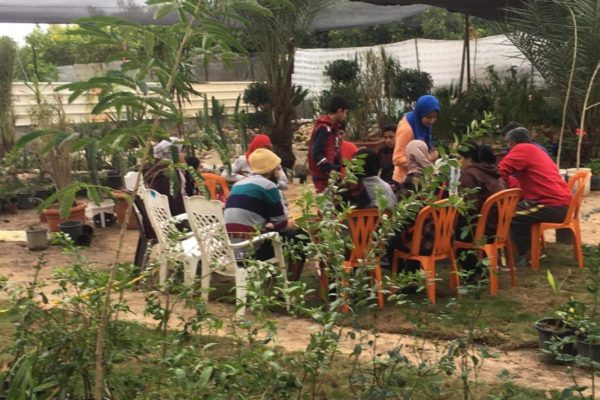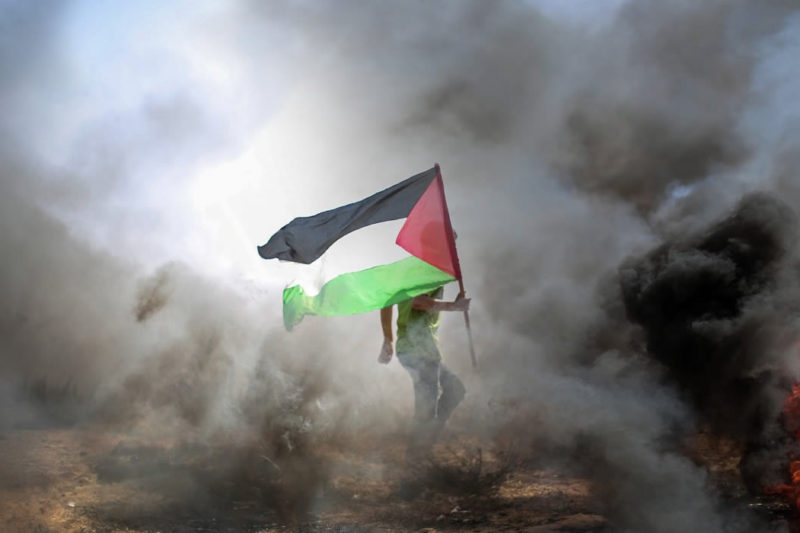Palestine: Fleeing home to save her life (4)

Omayma Masoud, a journalist with more than 20 years’ experience, was forced to leave her native Palestine after being threatened by Hamas. In the fourth part of her story – which she calls ‘river of despair’ – she tells of being arrested by the Greek police and put in a cell.
When I was bargaining my people trafficking deal in Turkey, I refused many offers to go to Greece by sea, although they were much cheaper, because I do not know how to swim. Since I almost drowned in the sea in Alexandria when I was 13 years old, a terrible fear of water had grown inside me. I had never been on a boat before.
I was forced to climb into that rubber dinghy to cross a wild river on my way to Greece, which was a terrible experience. The small vessel was carrying a much bigger load than it was designed for. It was swept by the torrential currents of the river and swirled around several times before the trafficker managed, using only small wooden oars, to put it back on course. The rubber dinghy swirled again, a big floating tree branch blocked the boat and stopped it.
Delilah, a young Syrian woman, shouted in horror:
– “We are going to drown, I do not swim. Do something for God’s sake.”
- “Shut up, your loud cries will give us away. If you do not swallow your tongue, I will throw you in the river.”
Delilah clung to my clothes and whispered to me:
- “We will drown, we will die, I will join my parents in heaven. Our journey is over.”
The trafficker pushed two men off the dinghy into the raging river, telling them to free it from the branch. They obeyed, gritting their teeth in anger. They managed to free the boat and we moved on.
I closed my eyes, lowered my head and kept on reciting verses of the Quran, trying hard to calm down and stabilise my troubled heart, until I heard them say: “We’ve arrived.”
Dalilah was a 21-year-old Palestinian girl from Gaza who went to visit her uncles in Al Yarmouk refugee camp in Syria, in January 2011, when she was only 12 years old. To her misfortune, she was caught up in Syria’s tragic problems and war erupted in March of the same year. She was so beautiful but with very sad eyes. I asked her about the sadness that crowned her beauty. She answered with tears and words:
- “My parents were killed. I and my four brothers survived. I moved from one relative’s house to another and ended up staying with my aunt Safea. That is her over there. She is accompanying me to go to Germany to marry my cousin. I have loved him all my life.”
- “Well, you are going to marry the love of your life, why are you so sad?” I said.
- “I can’t stop thinking of my imprisoned brother in the Syrian regime prison, my other brother joined ISIS and he swore to kill me because I do not cover my hair. The third brother moved to Germany two years ago but we have not heard from him since he left. The youngest is missing somewhere between Syria and Turkey. I can’t go back to Gaza. I can’t stay in Syria. I do not want to live in Germany. I am rootless and futureless. Even love can’t survive that.”
Getting out of the boat and climbing up a steep slope on the other bank was hard and left me with more wounds and bruises. The trafficker told me to take off my shoes to climb more easily. Barefoot, I crawled up again but a nasty thorny branch cut my ankle from the back. The wound didn’t bleed much, but it was very deep. I didn’t know that until it was too late. Later, I had to take off my shoes and stay barefoot, which led to the wound becoming infected; my whole foot, and perhaps my leg, would have been in serious danger, were it not for divine providence.
I only heard the word “only”
Submitting to new orders from the trafficker, Jalal took my hand and we dived together into the sea of thorns, to again tear our wounds and elicit our groans. A dream opened in my mind to a wonderful mythical fable where we could hide for about an hour to drink water, eat bread and smoke cigarettes.
Almost unconscious, I fell to the ground and, between dreaming and waking, I saw my house, my garden, and my green plants smiling at me, waving goodbye. I saw the Gaza sea roaring, as in the days of a rainstorm in January, which sent me warmth and some contentment to reassure me.
I jumped when they woke me, pulling me out of the feelings of familiarity with places in which I belonged, and throwing me into feeling of unfamiliarity with places where I would never belong.
The smuggler talked excitedly:
- “You will walk for only two hours to reach an agreed location, where the cars will come to take you to the city of Thessaloniki in the depths of Greece. This means that you will exit the border area – if discovered in it, you will be deported back to Turkey, but if you enter Thessaloniki, you will continue from there to Athens. In the worst scenario, if you are caught, you will be sent to a refugee camp”
I only heard the word “only”, but did not take in what the word really meant. Though I would later realise the literal meaning of each word through the very harsh practical lessons that were going to change my features and shape my consciousness.
We kept on walking steadily without stopping, even for a minute. I slowed down my pace due to exhaustion and soon found myself trailing behind the others. They had to stop, so that I could catch up with them on the bumpy dirt roads. The trafficker asked them to take it in turns to hold my hand and drag me along with them.
A young man held my hand gently and said:
- “You look like a ghost. Are you sick? I wonder what forced you to come this way?”
I just looked him in the eyes silently. A big tear rolled down my face, answering his question.
That question hit me so hard and brought back the vision of a dark, rough hand attaching the silencer to the pistol, then pointing the pistol to my forehead. Visualising the memory, I shivered from the strong presence of death, which left me in a completely silent daze.
- “In ten minutes, we will arrive at the point where we would wait for the cars.”
Finally, I would stop walking and running, I would catch my breath, and the damned journey would be over.
We continued walking along narrow sandy roads between fields of vegetables where we could see the houses’ lights in a nearby village.
I drowned myself in thoughts of the people behind closed doors feeling warm and safe. I wondered if I would get the chance to ever feel safe? The response to my question came as a shock, explaining in detail the full meaning of insecurity, when suddenly the trafficker shouted, “hide”.
Arrestation by Greek police
Everyone jumped into the trees on both sides of the road. The floodlights of police cars lit up the whole area. Where did they come from? We did not hear any sound from them, it was as if the earth had split open and they came out of it.
Footsteps approached me and a bright light flashed in my face, and I heard a voice saying in English:
– “Do not be afraid, we are the Greek police.”
I also heard voices in Arabic and Kurdish:
– “They’ve caught us.”
– “If any of you speak and reveal the identity of the trafficker to the police, we will kill him, even if he is in China.”
The policemen asked everyone to untie their shoelaces and put them in their bags, then told us to sit on the ground in a row with our heads lowered between our knees.
They confiscated our mobile phones, and when I told them that I did not have one, they did not believe me, so I told the policeman:
- “You can search my bag and my clothes and you won’t find one.”
- “What is your profession?”
- “Journalist.”
- “That’s why you answer with such confidence.”
- “It’s because I’m telling the truth.”
- “What is your nationality?”
- “Palestinian.”
- “Liar, everyone claims to be Palestinian.”
- “But I’m Palestinian.”
- “Are you married?”
- “Why are you asking? Do you want to propose to me?”
He laughed and said: “You’re wearing a wedding ring.”
- “It’s my late father’s ring.”
- “Was your father killed in the war?”
- “No, he died in an open-heart surgery operation in the hospital.”
N.S, the man sitting next to me elbowed me and whispered: “Say that all your family were killed in the war, this is better for you.”
- “I will not lie.”
- “You will regret it. I will tell you why. People sympathise with victims of wars. The world does not care about Palestinians anymore. They even forget that we exist. Only, during the war, they remember us.”
- “What a cruel fact that is.”
N.S is a Palestinian man from the unfortunate city of Gaza. He was 42 years old and a father of five children. He was an officer in the notorious Preventive Security Service in Gaza, according to N.S himself:
- “I am running for my life, just like you, and like many of us in this forest. Death and I live in parallel lines since the year 2006 and still today. I learned all forms of death. I face it every day. I survived it a lot and still do.”
- “What do you mean?”
- “On 25 January 2006, when Hamas won the Palestinian election, I went to the President’s office premises to hear the announcement. Hearing that Hamas had won drove me crazy. I took my automatic rifle and went out into the yard of the building, shooting randomly and screaming hysterically: ‘Oh God, what’s happening? Where are you, Yasser Arafat? Why did you leave us? We’ve got lost since you’ve gone.’
- “Wait a moment, I remember this. I was in my office at the Palestine television premises next to the President’s office. I heard the shouting and looked from the window. I saw you. Soldiers hurried towards you. They surrounded you with their weapons and took your gun and then they took you somewhere, and after that there was a charged tension and an awkward silence.”
- “That is right. What a coincidence. I thought no one would believe me anymore. They put me in jail to discipline me. My military rank was lowered as well. I swallowed my pride, submitting to orders to accept reality.”
- “That was long ago, let it go.”
- “I did, but both sides won’t leave me alone. You won’t believe what I have been through.”
- “I believe you, I have seen the other face of truth, it’s ugly.”
H.S continued:
- “In the bloody black year of 2007, when Hamas launched a military coup against the Palestinian National Authority and seized the Gaza Strip by military force and killing, the Hamas Internal Security Service arrested me, interrogated me, tortured me in their prison cells, and sentenced me to six years in prison on charges of possessing and concealing weapons and communicating with hostile parties. Every scar I carry on my body reminds me of days and nights of torture, humiliation, oppression and injustice. After that, I was released from prison. I was forced to stay at home. Another prison inside my house for almost four years until the beginning of 2018. It seemed that attempts at reconciliation between Fatah and Hamas might succeed. Delegations from the Palestinian Authority began visiting Gaza, and I and some of my colleagues were summoned to meet with Fatah leaders. We were all so happy, believing that things would go back to normal and that we would come back to life again. We were wrong. We were so naïve, of course; you know of the attempt to assassinate the Palestinian Prime Minister through an explosion targeting the motorcade of cars that brought him to Gaza. That explosion opened the doors of hell. Imagine that you are floating in outer space; calm and cool, reassuring and terrifying at the same time. Suddenly you feel something pulling on you, heavy at first, but strengthening as it pulls you into a faraway corner of the sky. In the blink of an eye, you have entered the black hole. The same day, I received many calls from unknown people claiming to be my superiors, threatening me to keep my mouth shut concerning the meeting with Fatah leaders. At night, many masked armed men broke into my house. They blindfolded me and took me to an unknown place. I still do not know where it was. I was tortured for over a month to reveal issues and secrets that I have not known anything about. No one believed me. My wife sold our apartment to bail me out of prison and to finance my escape from Gaza. My wife planned everything. She begged me to leave her, my children and run for my life.
I feel so ashamed for leaving them behind. It’s my duty now to try to find them a life somewhere even if it is in the middle of nowhere.”
He lowered his head in silence. I turned my face away, respecting his pain. I had lived through such pain myself.
We waited in that uncomfortable position on the ground for almost an hour, until a military prisoners’ vehicle arrived. It was densely crowded and cramped with more than 60 people of different nationalities, races, dialects, and colours.
Like the buzzing of thousands of bees, the hums and groans rose to a deafening level and resounded in my head like the hammers of a forge. Oxygen atoms evaporated inside the armoured prisoners’ vehicle due to its sealed windows, although there was a small hole covered with iron netting in the back door.
Air withdrew from my lungs and became scarce, leaving me grasping for breath. My knees collapsed, unable to bear my exhausted body. I resisted with all of what was left of my strength because if I fell to the ground, I would never be able to get up again, and I risked being squashed under the feet of the fellow occupants.
A violent argument erupted between the crammed people and turned into a fierce fight. A man pulled out a knife and tried to stab another man.
Terrified, like a feather lost in a storm, I turned my back to the stream of fighting people and received lots of kicks and blows whenever the vehicle tilted. When it stopped the daylight blinded my eyes as the door was opened.
With trembling legs, I descended the iron steps of the vehicle to the shouting of the policemen awaiting us:
- “He is holding a knife. They are going to kill each other.”
A policeman calmly replied:
- “I don’t care. Empty your pockets and your bag, take off your jacket and your shoes and put everything on the ground then come here for inspection.”
He searched my things thoroughly, took everything and threw my small agenda back to me. If he had known how much important information that agenda held on its pages, he would not have given it back to me. It contained all the phone numbers, instructions, addresses, and names of people waiting for me in Athens, as well as the code for the money deposited in Turkey, awaiting my arrival at my destination to be given to the smuggler in order to complete the payment.
He approached me with a small inspection scanner device. It beeped.
- “Follow me.”
He took me to a room in the back, and told me:
- “Take off all your clothes and throw them to me.”
- “No way. I will not. There are metal buttons on my shirt. I will give you my shirt and you will see that your scanner won’t beep anymore.”
He was so impatient, so he agreed and scanned me again without the shirt. It went well.
As if I was sentenced to death due to a shameful crime, I was walking in a daze. Is this really happening to me? Are they really going to put me in prison? What is going to happen to me next? The answers to my questions remained to be seen.



